数据分析:SQL和Python
Posted 青果HA
tags:
篇首语:本文由小常识网(cha138.com)小编为大家整理,主要介绍了数据分析:SQL和Python相关的知识,希望对你有一定的参考价值。
SQL
统计数据概况:计算样本总数、商家总数、用户总数、消费总数、领券总数等
select
count(User_id) as '样本总数',
count(distinct Merchant_id) as '商家总数',
count(distinct User_id) as '用户总数',
count(Date) as '消费总数',
count(Date_received) as '领券总数',
(select count(*) from ddm.offline_train as a where a.Date_received is not null and a.Date is not null) as '领券消费总数',
(select count(*) from ddm.offline_train as a where a.Date_received is null and a.Date is not null) as '无券消费总数',
(select count(*) from ddm.offline_train as a where a.Date_received is not null and a.Date is not null)/count(Date_received) as '核销率'
from ddm.offline_train
统计不同距离下:领券人数、用券消费人数、核销率
# 查找各距离的领券人数/用券消费人数/核销率
select
Distance,
count(Coupon_id) as get_coupons_num,
sum(if(Date_received is not null and Date is not null,1,0)) as user_coupons_num,
sum(if(Date_received is not null and Date is not null,1,0)) /count(Coupon_id) as use_coupons_rate
from ddm.offline_train
where Distance is not null
group by Distance
order by distance 消费券使用情况占比
消费券使用情况占比
# 消费券使用情况占比
with temp as (
select
case
when Date_received is not null and Date is not null then '有券消费'
when Date_received is not null and Date is null then '有券未消费'
when Date_received is null and Date is not null then '无券消费'
end as flag
from ddm.offline_train
)
select
flag as '优惠券使用情况',
concat(round(count(flag)/(select count(*) from temp)*100,2),'%') as '百分比'
from temp
group by flag
order by count(flag)/(select count(*) from temp) 
with as 也叫做子查询部分,类似于一个视图或临时表,可以用来存储一部分的sql语句查询结果,必须和其他的查询语句一起使用,且中间不能有分号,目前在oracle、sql server、hive等均支持 with as 用法,但 mysql并不支持!
不同类型优惠券的核销情况和平均领取距离
# 不同优惠券类型的核销情况和平均领取距离
select
Discount_rate as '折扣',
avg(Distance) as '平均距离',
count(Date_received) as '领券人数',
sum(if(Date_received is not null and Date is not null,1,0)) as '有券消费人数',
sum(if(Date_received is not null and Date is not null,1,0))/count(Date_received) as '核销率'
from ddm.offline_train
where Date_received is not null
group by Discount_rate
order by '有券消费人数' desc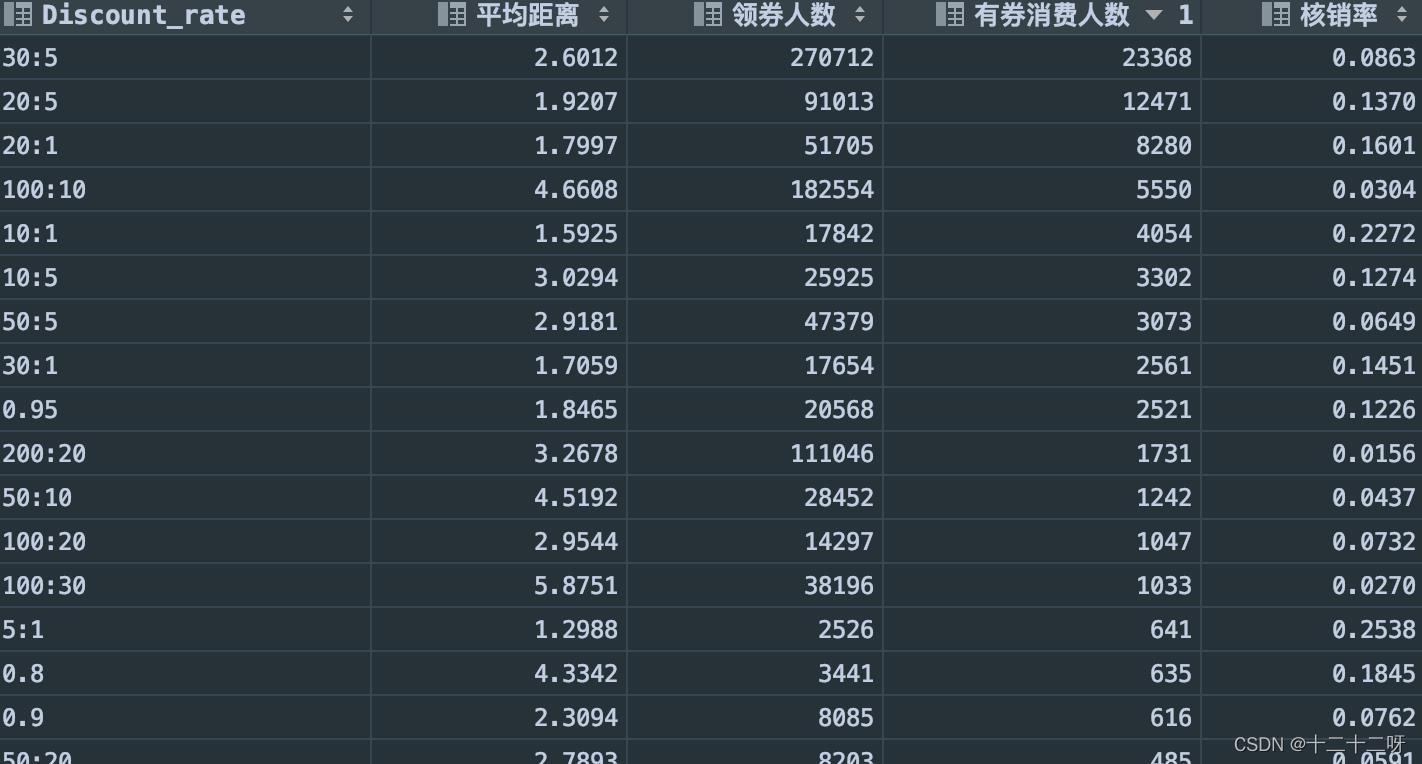
不同满减门槛的核销情况
# 不同满减门槛的核销情况
select
mk as '门槛',
count(*) as '领券数量',
sum(if(Date is not null,1,0)) as '用券消费数量',
concat(round(sum(if(Date is not null,1,0))/count(*)*100,2),'%') as '核销率'
from(select
DATE,
convert(if(Discount_rate like '%.%',0,Discount_rate),signed) as mk
from ddm.offline_train) as aa
where mk is not null
group by mk
order by mk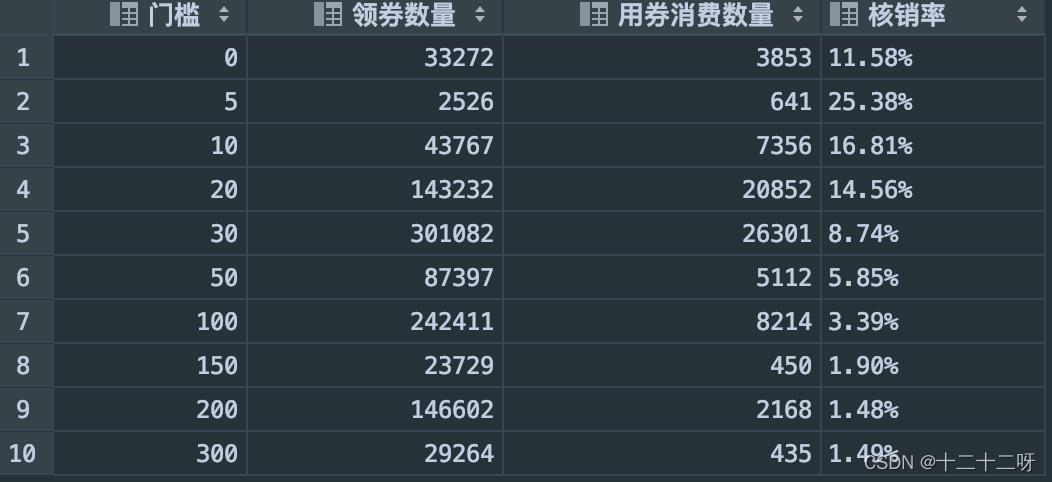
不同核销率的商家分布情况(占比)
# 不同核销率用户分布
with temp as (
select
Merchant_id,
count(Date_received) as get_num,
sum(if(Date is not null and Date_received is not null,1,0)) as use_num,
sum(if(Date is not null and Date_received is not null,1,0))/count(Date_received) as Merchant_rate
from ddm.offline_train
where Date_received is not null
group by Merchant_id
)
select
tag,
concat(round(count(*)/(select count(*) from temp)*100,2),'%') as Merchant_percent
from(
select
Merchant_id,
case
when Merchant_rate = 0 then '核销率:0'
when Merchant_rate > 0 and Merchant_rate < 0.2 then '核销率:0-20%'
when Merchant_rate >= 0.2 and Merchant_rate< 0.3 then '核销率:20%-30%'
when Merchant_rate >= 0.3 and Merchant_rate< 0.5 then '核销率:30%-50%'
when Merchant_rate >= 0.5 then '核销率:50%以上'
end as tag
from temp
)aa
group by tag
order by Merchant_percent desc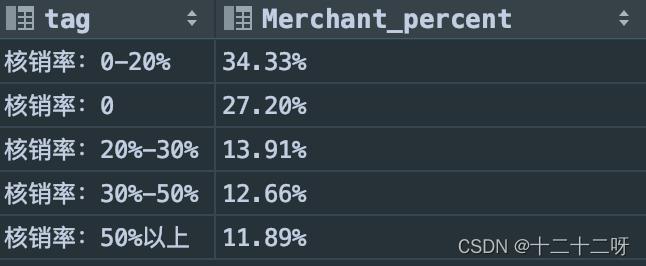 不同领券次数商家的分布情况(平均核销率/占比)
不同领券次数商家的分布情况(平均核销率/占比)
# 不同领券次数用户分布-平均核销率/占比
with temp as (
select
Merchant_id,
count(Date_received) as get_num,
sum(if(Date is not null and Date_received is not null,1,0))/count(Date_received) as user_rate,
sum(if(Date is not null and Date_received is not null,1,0)) as use_num,
case
when count(Date_received)>100 then '100次以上'
when count(Date_received)=0 then '0次'
when count(Date_received) between 1 and 10 then '1-10次'
when count(Date_received) between 11 and 50 then '11-50次'
when count(Date_received) between 51 and 100 then '51-100次'
else '其他次'
end as flag
from ddm.offline_train
group by Merchant_id
)
select
flag as '被领券次数',
concat(round(avg(user_rate)*100,2),'%') as Merchant_avg_use_rate,
concat(round(count(*)/(select count(*) from temp)*100,2),'%') as Merchant_percent
from temp
group by flag
order by (count(*)/(select count(*) from temp)) desc
不同核销率用户分布(占比)
# 不同核销率用户分布
with temp as (
select
User_id,
count(Date_received) as get_num,
sum(if(Date is not null and Date_received is not null,1,0)) as use_num,
sum(if(Date is not null and Date_received is not null,1,0))/count(Date_received) as user_rate
from ddm.offline_train
where Date_received is not null
group by User_id
)
select
tag,
concat(round(count(*)/(select count(*) from temp)*100,2),'%') as user_percent
from(
select
User_id,
case
when user_rate = 0 then '核销率:0'
when user_rate > 0 and user_rate < 0.3 then '核销率:0-30%'
when user_rate >= 0.3 and user_rate< 0.5 then '核销率:30%-50%'
when user_rate >= 0.5 then '核销率:50%以上'
end as tag
from temp
)aa
group by tag
order by user_percent desc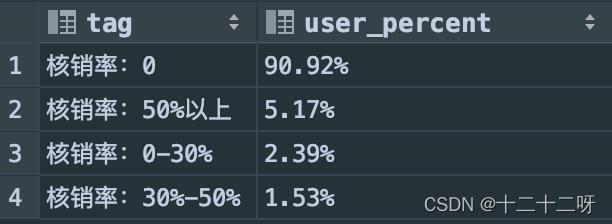
不同月份优惠券领券次数/核销次数/核销率
# 不同月份领券次数/核销次数/核销率
select
`month`,
coupons_get_num,
coupons_use_num,
concat(round(coupons_use_num/coupons_get_num*100,2),'%') as coupons_use_rate
from(select
month(Date_received) as `month`,
count(*) as coupons_get_num
from ddm.offline_train
where Date_received is not null
group by month(Date_received)) as a
inner join(
select
month(Date) as `month`,
count(*) as coupons_use_num
from ddm.offline_train
where Date_received is not null and Date is not null
group by month(Date)
)as b using(`month`)
order by `month`
不同工作日的优惠券平均核销周期、核销率
# 工作日平均核销间隔、核销率
with get_coupons as(
select
weekday(Date_received)+1 as coupons_day,
count(*) as coupons_get_num
from ddm.offline_train
where Date_received is not null
group by weekday(Date_received)+1
),
use_coupons as(
select
weekday(Date)+1 as coupons_day,
count(*) as coupons_use_num,
round(avg(datediff(Date,Date_received)),2) as use_interval
from ddm.offline_train
where Date is not null and Date_received is not null
group by weekday(Date)+1
)
select
coupons_day,
use_interval,
concat(round(coupons_use_num/coupons_get_num*100,2),'%') as coupons_use_rate
from get_coupons
inner join use_coupons using(coupons_day)
order by coupons_day
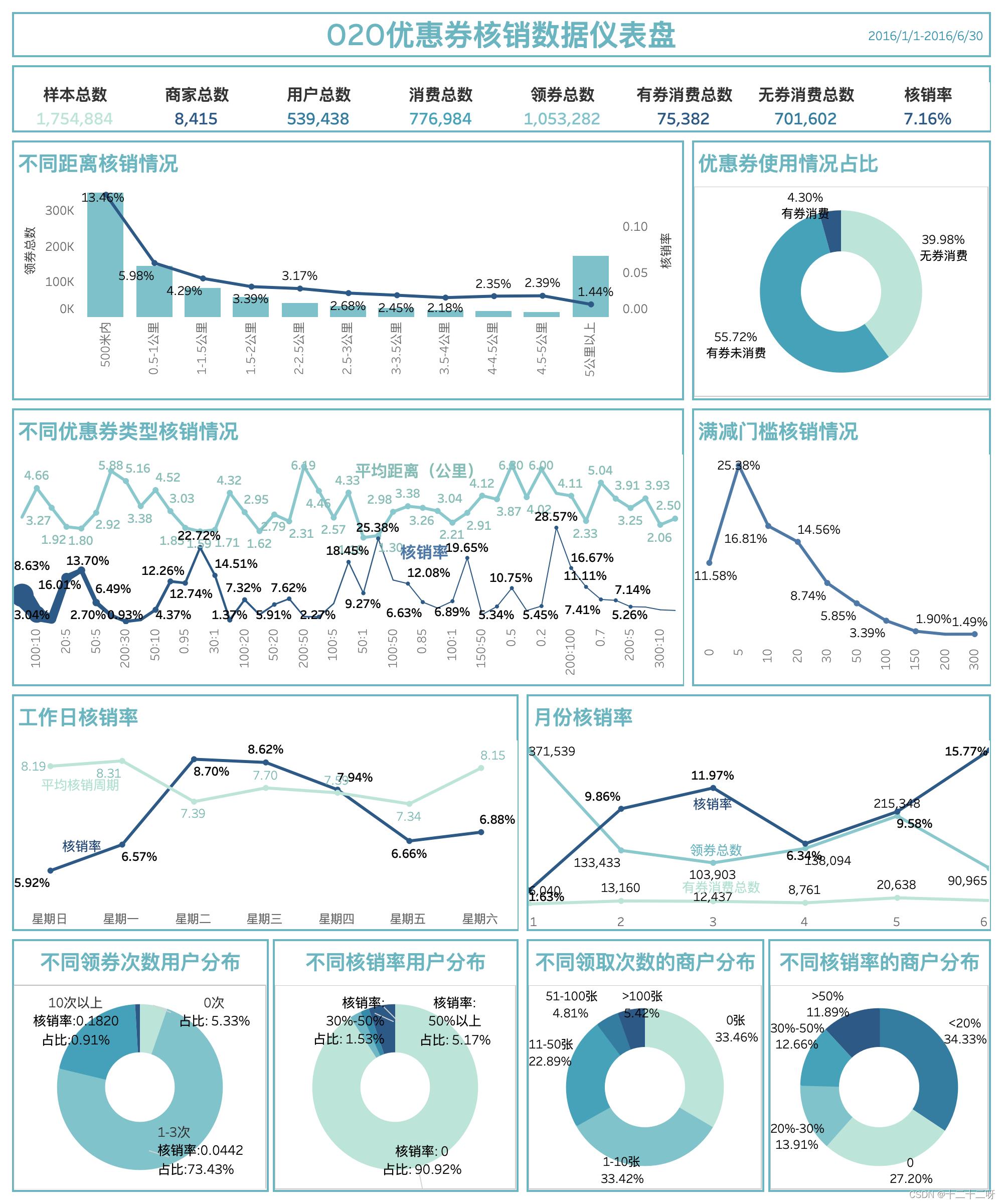
Python
库包
- pandas: 支持从CSV、JSON、SQL、Microsoft Excel load数据,可以对各种维度的数据做归并、再成形、选择,还有数据清洗和数据加工特征
- numpy:存储和操作矩阵、数组计算的包:数组计算、逻辑运算、傅立叶变化和图形操作、跟线性代数相关的操作
- Matplotlib:绘图工具可以绘制线图、散点图、等高线图、条形图、柱状图、3D 图形、甚至是图形动画等。
- sklearn:它涵盖了分类、回归、聚类、降维、模型选择、数据预处理六大模块,降低机器学习实践门槛,将复杂的数学计算集成为简单的函数,并提供了众多公开数据集和学习案例。
数据预处理
data = pd.read_csv(r"/Users/xll/Documents/服务数据质量/测试数据1.csv")
#返回数据集行和列的元组,其中data.shape[0]代表返回行数,data.shape[1] 代表返回列数
print(data.shape)
#返回数据集的所有列名
data.columns
#随机返回样本5行
data.sample(5)
#返回前5行
print(data.head(5))
#返回浮点型和正行字段的均值、最大值、等统计数据
print(data.describe())
#numpy包的这个方法也是可以得到同样的结果
import numpy as np
print(data.describe(include=[np.number]))

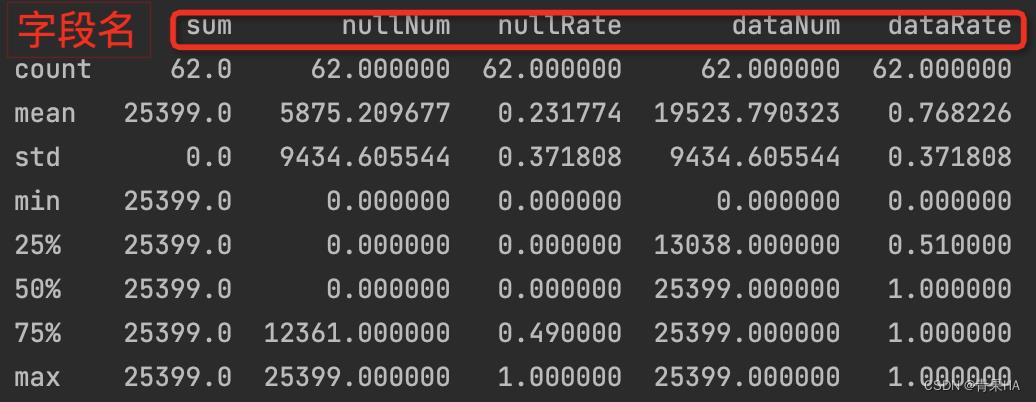
参考:
https://blog.csdn.net/twlve/article/details/128609147?spm=1001.2014.3001.5502
https://blog.csdn.net/twlve/article/details/128626526?spm=1001.2014.3001.5502
O2O优惠券核销-数据分析_十二十二呀的博客-CSDN博客_优惠券数据分析
以上是关于数据分析:SQL和Python的主要内容,如果未能解决你的问题,请参考以下文章